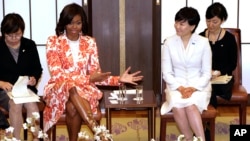U.S. first lady Michelle Obama is in Tokyo to promote a girls education initiative to help the 62 million girls in the developing world who are not in school.
Japan provides girls equal access to education, but the country has one of the worst gender gap ratings in the world when it comes to women in the workplace after they graduate from school.
In Tokyo, Obama announced the "Let Girls Learn" initiative while meeting with Japanese first lady Akie Abe.
“I know that for every girl like me, there are so many others across the globe who are just as smart, just as capable, just as hungry to succeed, but they never have the chance to go to school,” she said.
Obama said the fact that 62 million girls are unable to attend school is a "profound waste of human potential.”
She enlisted Japan to provide $340 million to fund empowerment and gender-sensitive education programs. The Japan Overseas Cooperation Volunteers will also cooperate with the Peace Corps to focus on educating girls.
Japan's gender-gap issue
Naomi Koshi, the mayor of the Japanese city of Otsu, commended Obama and Abe for leading this effort, but said she would also like to see Japan deal with its own gender gap issue.
“I think Mrs. Obama is focusing on girls' education, especially in developing countries, so this is a more serious issue. But in Japan we still have issues, even well-educated women can’t continue to work,” Koshi said.
According to the World Economic Forum’s Global Gender Gap Report, which evaluates countries on economic, political, education, and health-based criteria, Japan ranked 105th out of 136 countries in 2013.
While there is virtually no gender gap in education enrollment, women in Japan face significant institutional and cultural obstacles in the workplace.
In Japan, raising children is still considered the responsibility of women. Because there is a severe shortage of affordable child care, over 60 percent of Japanese women who have children end up quitting their jobs.
Economics Professor Machiko Osawa, with the Research Institute for Women and Careers at Japan Women’s University, said this expectation leads to discrimination in the corporate world.
“Once you are hired after you graduate from school, companies spend lots of money to train workers. But women tend to quit due to child bearing or marriage, so that the company does not want to take a risk,” Osawa said.
Mayor Koshi said that in order to compete in this male-dominated culture, she had to make a choice.
“I don’t get married. I don’t have [a] child so I can work as a man. But I don’t think it is ... good because this [is] typical [of] Japanese women. We have to choose work or child,” she said.
Fertility rate has fallen
Many women like Koshi have either postponed or decided not to have children, causing Japan’s fertility rate to fall. Japan already has one of the world's highest proportions of elderly people. The shrinking pool of young workers contributes to the country’s stagnant economy.
The gender gap of Japanese women in the workforce has also resulted in a high poverty rate for children of single mothers.
What is needed, women advocates said, is government funding for more affordable child care, the strengthening and enforcement of the gender equality law, and a cultural shift for men to take more responsibility for raising children.
Japanese Prime Minister Shinzo Abe has vowed to significantly boost the participation of women in the workforce and improve pay for women who, on average, earn 30 percent less than men.
But Professor Osawa is skeptical that Prime Minister Abe will fulfill the financial and legal commitments to make this happen.
“I [am] watching him carefully so to whether this is [an] empty promise or he can do something. So far he hasn’t done much in real terms,” Osawa said.
While Osawa agrees the lack of access to education for girls in the developing world is a waste of human potential, so, too, is the workforce gender gap in Japan.












